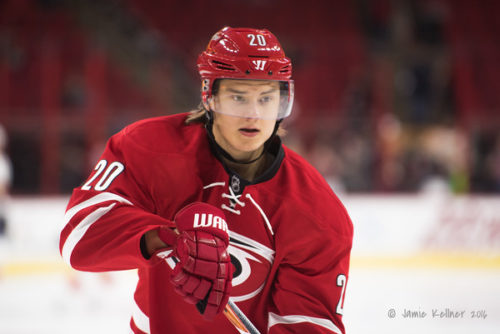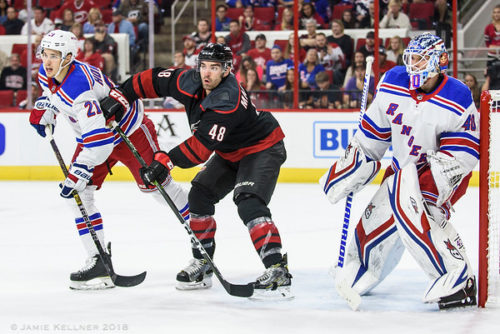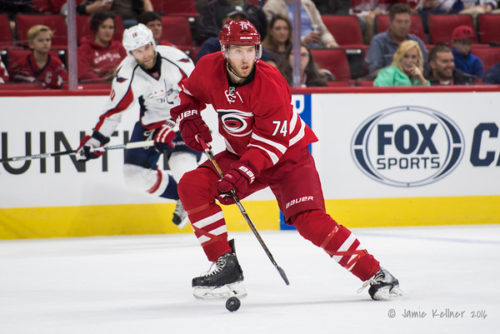Saving the best for last and also maybe a well-timed look at the future for suffering Canes fans, this post wraps up a ‘7 D in 7 days’ series by featuring the leader of the Hurricanes blue line present and future – Justin Faulk.
If you are just catching up, here are links to the previous parts:
1-John-Michael Liles
2-Ryan Murphy
3-Brett Pesce
4-Noah Hanifin
5-Michal Jordan
6-Ron Hainsey
Justin Faulk relative to normal defenseman development
I think an important starting point for Justin Faulk is understanding where he is right now and how that plots relative to normal growth. Even good young defensemen usually spend 1 if not 2 years at some lower level after being drafted and then are often still 1-2 years away from entering the NHL. Even then, there is a gradual progression upward in terms of responsibility and where they sit on the depth chart. For every Aaron Ekblad-type headline, there are 9-10 other defensemen who ultimately become great players but do so on something more like a 4-6 year schedule after being drafted.
Justin Faulk was drafted in 2010. If you do the math of 2 years at lower level plus most of 2 years in the AHL, Justin Faulk should be in his second NHL season and just starting to settle in start a climb up the depth chart. Instead he is a bonafide #1 NHL defensemen, an alternate captain and a leader of the team in terms of ice time, scoring and just about everything else. Not to be lost in his rapid ascension is the fact that he is only 23 years old and is still developing as a player.
- He just added the higher gear offensively last season after a modest progression before that.
- Though he got out of the gate much better than a couple younger years, he is still working on every-night consistency.
- And I think he still has another level that is on the way in terms of creating more offense for the forwards when he is on the ice.
But continued possible improvement is a bonus. Even if none of it ever happens, he still easily qualify as a good top pairing NHL defenseman. That said, I think he is still rising which is incredibly exciting and bodes well for at least the top slot on the Hurricanes blue line for many years to come.
Justin Faulk’s strong starting point/initial foundation
Out of the gate, I think Justin Faulk was able to jump right into the NHL and do reasonably well because he was physically ready and because he was so advanced already in terms of skating skill. He was a big, strong kid even as a 20-year old. And it was noticeably apparent how good of a skater he was in small spaces. His ability to stop, turn, cut, change direction, quickly retrieve a loose puck, etc. was off the charts for his young age and is clearly a natural ability for him. It made him a naturally good defenseman without the puck. His physical skills combined with the most important ability to process the game at NHL speed and not make a ton of mistakes in the process carved him an incredibly fast path to being at least serviceable if not better as a top 4 NHL defenseman far before it made sense.
Interestingly and as an aside, I think that is exactly what we are seeing with Brett Pesce. I would not say that Brett Pesce is a difference-maker in terms of winning hockey games yet, but he is not a difference-maker in terms of losing hockey games either. Pesce has room to improve (as 1 would expect from any 20-year old) in terms of skating ability, but eerily similar to a young Justin Faulk, he skates incredibly well in small spaces which enables him to get to pucks, win pucks, defend in the defensive zone, etc. He also has a beyond his years ability to process the game at NHL speed and make good decisions even under duress.
Defensively
But I digress…The other thing that jumps out about Justin Faulk is his ability to start from a very good base and make significant improvements on an ongoing basis. He was always pretty good at making quick/assertive plays getting to pucks and defending, but along the way he has improved physically in terms of being even faster in the 15-foot races and even more crisp in terms of winning the puck and getting it to a place where he can keep it either by making a quick pass, turning to open ice or just protecting it for oncoming contact. Also from a reasonably strong base, he has continued to improve his straight line speed.
Shorter version is to say that he continues to improve as a defender.
Offensively
A little bit more out of the blue has been his progression offensively. Only 2 years ago, we all loved Justin Faulk and his potential to be (if he was not already) a top pairing NHL defenseman. At the time, I would have pegged him as having a bit of offensive upside, but maybe being more the defense half with a more skating/creating type of partner. Then 2014-15 happened. Faulk started to carry the puck a bit more and most significantly his decent velocity point shot seemed to upgrade by a factor of 5 overnight. His accuracy is now through the roof. Even when he misses, most times the puck is in the vicinity of the target such that a tip or deflection is possible. More significantly, he has become incredibly good at picking corners instead of just trying to get it on net. And along the way, he has become incredibly good at finding the right combination of finding space, moving with/without the puck and finding shooting lanes such that even though he is now a known trigger man, he is still regularly finding good shot opportunities especially on the power play. It is too early in the season to declare an ultimate victory, but is it fair to say at this moment in time he is the best blue line shot in the NHL right now even surpassing Weber, Chara, Subban and others who generally get this kind of credit? Again, we are only 16 games into the season, but his 6 power play goals (5 off point shots) clearly stake him to a lead in this race.
A little more under the radar is his huge leap late last season and into the 2015-16 season in terms of carrying the puck. With Sekera, it was more of a 50/50 split that actually leaned a bit more toward Sekera especially early in their time together. But once unshackled from Sekera, Faulk took a huge step up in terms of being the heavy lifter in terms of moving the puck for his pairing. That has carried over into 2015-16.
The upshot
I think there are a couple upshots from watching Justin Faulk’s development especially recently:
1) He is already a very good top pairing NHL defenseman with the right mix of having a defensively solid stay-home base but more recently adding a scoring component which is a must in today’s NHL where you need offense from many sources.
2) I do not think he has reached his peak yet. His scoring prowess with his shot is a fairly new development that hit a much higher gear just last season. His propensity and ability to carry the puck is even more recent than that. Eventually, he will hit a ceiling where the degree of improvement is limited, but I am not sure he is actually there yet.
3) That is incredibly exciting as a Canes fan!
Leadership
The other thing that you have to love about Faulk is his natural progression as a leader. He very clearly has that fire in his belly. It erupts occasionally (and usually at good times) on the ice when he steps into a fray to make a statement. From a young age, he very clearly sets a high standard for himself and puts winning first.
One of my strongest early impressions of Faulk was him being interviewed after a Canes loss after he returned from a layoff due to injury. He played reasonably well but made a costly mistake that was part of the Canes losing. The interviewer was working through the usual run of the mill, gentle questions. How did it feel to be back? Did you get your legs back? There were some good takeaways from the game. Etc. When asked somewhat directly about his thoughts on his play but importantly not about his mistake, he responded by saying something along the lines of doing some good things but pointing out the mistake himself and how it hurt his team and that he needed to be much better next game. He was taking it upon himself to set the high standard right from the start. He was not having his confidence protected. He did not need to be coddled. He was holding himself to an NHL standard from the start and was fine with the accountability of that.
You can see the progression of that today. Just last night, you could see how it burned him to have a 2-0 lead and not converting it to a win. His post-game quote to the tune of ‘needing to find a way to win these games’ is telling. He had a pretty good game. He scored a league-leading sixth power play goal. It was nowhere near good enough for him.
And that desire to win and pain when he does not combined with natural ability is what impresses and excites me about Justin Faulk the most.
What’s next?
Per my comments, above Justin Faulk is already a good player and legitimate top pairing NHL defender. He does not need to improve to get there. He just needs to do consistently what he is doing already.
This said, I think there are at least 2 areas where Justin Faulk still has significant room to be even better:
1) Creating offense for his forwards. As noted above, Justin Faulk has very quickly climbed to an elite level as an NHL finisher. And if I could choose goals over playmaking, I would choose goals every day from a defenseman. But this said, I think there is still another level to be gained for Faulk in terms of creating scoring chances for the forwards off the rush and in the offensive zone. Also as noted above, he just really started to open things up in terms of rushing up the ice the second half of last season especially after the Sekera trade. He has mostly figured out level 1 as a puck-carrying defenseman which is how to size up the ice/situation/player positioning to find and navigate paths through the neutral zone. He has made great strides being able to carry the puck from blue line to blue line. And he is generally solid assessing when there is an opening for that versus making quick simple plays to advance the puck to a forward.
Level 2 is the ability to use initial skating to force actions from forecheckers and defenders and set things up in a way to creatively make passing lanes and scoring chances for forwards as you move up the ice. It is the ability to use the threat of the big shot to sometimes make a quick move to set up a passing lane for an opposite side 1-timer for a forward in the offensive zone.
As another aside, I think Ryan Murphy is very much in the same place in this regard. Murphy has significantly improved as assessing when, where and how to use his skating ability to get through the neutral zone and is much better at not skating into dead ends. The result is that he mostly picks good spots to carry and gain the offensive blue line himself. That is a positive. But the real upside comes when he can use his skating ability to create passing lanes that offer clean entries with speed for the forwards in front of him and then join the rush to create an numbers advantage. But getting back to Justin Faulk…
Shorter version: Justin Faulk has fairly recently taken a big step up in terms of carrying the puck but thus far the positive result is mostly just to get through the neutral zone and gain the offensive blue line. The next step is to use his skating to create more offense for the forwards on the ice with him.
2) He continues to make strides, but consistency is still a work in process. His high end on a good night is easily top 2 defenseman level. The challenge is still being a #2 or at least a good #3 on a night when the legs are sluggish, it just is not your night. I count 2 tough games for Faulk this season and no runs of them. That is on the path to that elite level where you adjust and simplify on off nights and the downgrade is so small that at least opposing fans would not even know the difference.
In the NHL, there are a limited number of stars or elite players in terms of ability, production and skill. There are even fewer who meet the category of elite in terms of play and also character and leadership such that they are the kind of player you model and build your entire team around. Justin Faulk is one of those rare players.
Go Canes!



